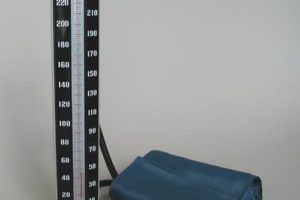johns hopkins university school of medicine
Feet first? Old mitochondria might be responsible for neuropathy in the extremities
The burning, tingling pain of neuropathy may affect feet and hands before other body parts because the powerhouses of nerve cells that supply the extremities age and become dysfunctional as they complete the long journey to these areas, Johns Hopkin…
Hearing loss rate in older adults climbs to more than 60 percent in national survey
Nearly two-thirds of Americans age 70 and older have hearing loss, but those who are of black race seem to have a protective effect against this loss, according to a new study led by Johns Hopkins and National Institute on Aging researchers. These f…
Famed neurosurgeon’s century-old notes reveal ‘modern’ style admission of medical error
The current focus on medical errors isn’t quite as new as it seems. A Johns Hopkins review of groundbreaking neurosurgeon Harvey Cushing’s notes, made at the turn of the last century, has turned up copious documentation of his own surgical mishaps a…
Macho muscle cells force their way to fusion
In fact, according to new research from Johns Hopkins, the fusion of muscle cells is a power struggle that involves a smaller mobile antagonist that points at, pokes and finally pushes into its larger, stationary partner using a newly identified …
Math may help calculate way to find new drugs for HIV and other diseases
Using mathematical concepts, Princeton researchers have developed a method of discovering new drugs for a range of diseases by calculating which physical properties of biological molecules may predict their effectiveness as medicines.
The techn…
Johns Hopkins researchers capture jumping genes
An ambitious hunt by Johns Hopkins scientists for actively “jumping genes” in humans has yielded compelling new evidence that the genome, anything but static, contains numerous pesky mobile elements that may help to explain why people have such a var…
Minimally invasive technique appears helpful to reanimate facial paralysis
A procedure involving only one small incision and no major modifications to bone can be used to transpose a tendon and appears helpful in reanimating the lower face after paralysis, according to a report in the January/February issue of Archives of …
Protein involved in cystic fibrosis also plays role in emphysema, chronic lung disease
A team of Johns Hopkins Children’s Center researchers has discovered that a protein involved in cystic fibrosis (CF) also regulates inflammation and cell death in emphysema and may be responsible for other chronic lung diseases.
The findings,…
Missing molecules hold promise of therapy for pancreatic cancer
By determining what goes missing in human cells when the gene that is most commonly mutated in pancreatic cancer gets turned on, Johns Hopkins scientists have discovered a potential strategy for therapy.
The production of a particular cluster of …
Buprenorphine is better than methadone for opioid dependence in pregnant women, study shows
Using buprenorphine instead of methadone — the current standard of care — to treat opioid-dependent pregnant women may result in healthier babies, suggests new findings from an international team led by Johns Hopkins researchers and publish…
On…off…on…off… The circuitry of insulin-releasing cells
A myriad of inputs can indicate a body’s health bombard pancreatic beta cells continuously, and these cells must consider all signals and “decide” when and how much insulin to release to maintain balance in blood sugar, for example. Reporting in N…

